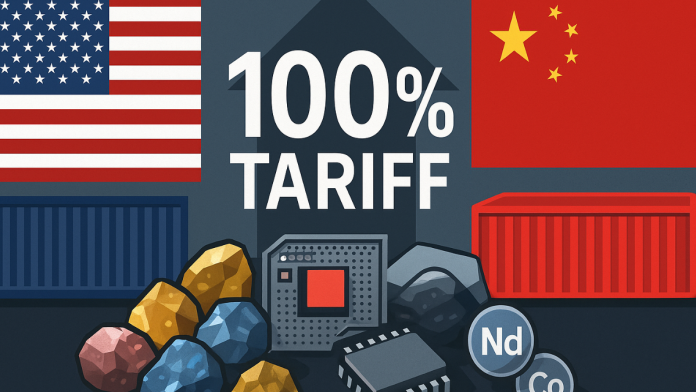Trade tensions between the United States and China have flared up again. U.S. President Donald Trump has announced plans to impose a 100% tariff on all Chinese imports starting November 1, or possibly even earlier.
Trump Announces New Tariffs on Chinese Goods
The decision follows China’s move to introduce new restrictions on the export of rare earth minerals, which are vital materials used in smartphones, electric vehicles, defense systems, and many other modern technologies.
In a post on Truth Social, President Trump called China’s export curbs “very hostile” and said that the United States would respond firmly. He stated, “Based on the fact that China has taken this unprecedented position, the United States of America will impose a tariff of 100% on China, over and above any tariff that they are currently paying.”
Trump said that China’s decision to limit exports came “out of the blue”, surprising other nations and industries that depend on these minerals. He added that no country should be allowed to “hold the world captive” by controlling the supply of materials essential to global manufacturing and national security.
TechInsights blocked in China after revealing foreign sources in Huawei AI chips
The White House confirmed that the President’s decision aims to push China to reconsider its export restrictions before November 1. However, Trump also mentioned that the new tariffs could take effect “sooner if necessary”.
China’s Rare Earth Restrictions and Global Concerns
Beijing’s Ministry of Commerce announced the new export rules on Thursday, requiring special government approval for any shipments of rare earth elements or even products containing small traces of them. Officials in China said the move was necessary to protect national security.
Rare earth minerals are a group of 17 metals used in producing high-tech products like semiconductors, magnets, and electric batteries. They play a crucial role in industries ranging from defense and aerospace to renewable energy.
China currently dominates the global supply of these minerals, producing about 60 to 70 percent of the world’s total. The new restrictions mean that any company or country relying on Chinese exports could face disruptions in their production lines.
The U.S. government has expressed concern that these export limits could hurt not only American industries but also global supply chains. President Trump has repeatedly criticized China for using trade controls as leverage in economic and political matters.
He also indicated that further measures—such as new limits on technology exports to China—could be introduced if Beijing continues to tighten control over rare earth shipments.
APEC Summit and Diplomatic Uncertainty
The announcement of new tariffs comes just weeks before the Asia-Pacific Economic Cooperation (APEC) summit, set to take place later this month in South Korea. Both President Trump and Chinese President Xi Jinping are expected to attend.
When asked whether the meeting between the two leaders would still happen, Trump said he had not cancelled it but was unsure if it would proceed as planned. “I’ll be there regardless,” he said, adding that China’s recent actions had “shocked the world”.
The planned tariffs are the latest sign that relations between Washington and Beijing are once again under strain. The two countries have been locked in trade disputes before, particularly during Trump’s previous term, when both sides imposed heavy duties on each other’s goods.
At present, Beijing has not issued an official response to the new U.S. tariff threat. However, observers expect that China may take time to study the situation before deciding how to respond.
The new developments have raised fears of a renewed trade war between the world’s two largest economies, with potential consequences for industries that depend on cross-border technology and materials.


